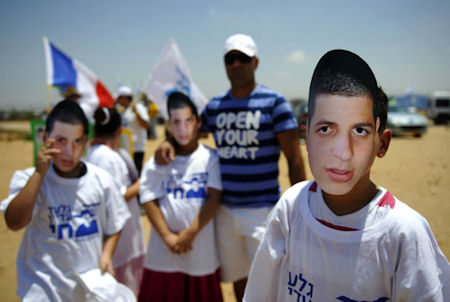![]()
Wed, Oct 12, 2011 | TabletMag.com | By Yossi Klein Halevi

A rally this summer marking the fifth anniversary Gilad Shalit’s capture. (David Buimovitch/AFP/Getty Images)
Gilad Shalit: Everyone’s Son
Originally published in the TabletMag. In opposing the mass release of terrorists in exchange for Gilad Shalit’s freedom, I felt as if I was betraying my own son.
For the last five years I have tried not to think of Gilad Shalit. I avoided the newspaper photographs of his first months as an Israel Defense Forces draftee, a boy playing soldier in an ill-fitting uniform. Sometimes, despite myself, I’d imagine him in a Gaza cellar, bound, perhaps wired with explosives to thwart a rescue attempt. And then I would force myself to turn away.
I tried not to think of Gilad because I felt guilty. Not only was I doing nothing to help the campaign to free him, I opposed its implicit demand that the Israeli government release as many terrorists as it takes to bring him home. Israel has no death penalty, and now we would lose the deterrence of prison: If the deal went through, any potential terrorist would know it was just a matter of time before he’d be freed in the next deal for the next kidnapped Israeli.
But the argument could never be so neatly resolved. Each side was affirming a profound Jewish value: ransom the kidnapped, resist blackmail. And so any position one took was undermined by angst. What would you do, campaign activists challenged opponents, if he were your son? “He’s everyone’s son,” sang rocker Aviv Gefen.
One day I passed a rally for Gilad in a park in downtown Jerusalem. Several counter-demonstrators were holding signs opposing surrender to terrorism. “I happen to agree with you,” I said to one of them. “But don’t you feel uneasy protesting against the Shalit family?”
“We’re not protesting against the Shalit family,” he replied. “We’re protesting to save future victims of freed terrorists. Those victims don’t have names yet. But they could be my son or your son.”
Every debate over Gilad ended at the same point: your son.
We never referred to him as “Shalit,” always “Gilad.” The Gilad dilemma set our parental responsibilities against our responsibilities as Israelis — one protective instinct against another. The prime minister’s job is to resist emotional pressure and ensure the nation’s security; a father’s job is to try to save his son, regardless of the consequences.
Yossi Klein Halevi is a fellow at the Shalom Hartman Institute in Jerusalem and a contributing editor at the New Republic.



 RSS
RSS










[…] the brilliant Yossi Klein Halevi thinking out loud about the Israeli psychology and issues involved in this […]